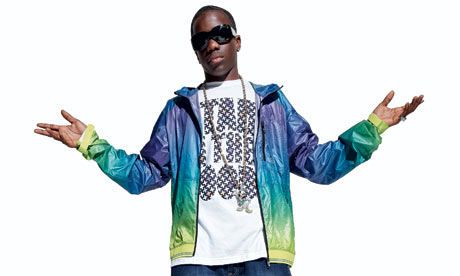
It's many years since anyone made one of those music biopics in which the subject plays him or herself. Nevertheless, it's a sub-genre that might be worth reviving for Tinchy Stryder, not least because the story of his rise to fame sounds exactly like a pitch for a certain kind of undemanding British comedy. Two clueless middle-class kids (Rupert Grint, Nicholas Hoult from Skins) set up their own rap promotions company in Norfolk. They alight upon an unsigned east London rapper, funding his career with contributions from their grand-parents (Leslie Phillips and June Whitfield) and the local Catholic priest (Rowan Atkinson). One half of the promotions team also taps a loan from his parents, the Liberal Democrat MP for North Norfolk (Jim Broadbent) and his supportive wife (Celia Imrie). Much fish-out-of-water hilarity ensues (Ray Winstone as a nightclub doorman, Rhys Ifans as a shady recording studio manager, Tim Westwood, Lembit Opik and Lethal Bizzle as "themselves"), before they succeed in making their charge one of Britain's biggest pop stars (cameo from Johnny Vegas as Chris Moyles) thanks to two consecutive chart-topping singles: the latest of which, Never Leave You, leapfrogged the Black Eyed Peas and Beyonce to enter the charts at No 1 on Sunday.
In the film, all would end well. The final scene would feature Tinchy Stryder performing a rapturously received gig at the House of Commons, during which the prime minister (Matt Lucas) would turn to the stuffed-shirt civil servant who has mocked the rapper's progress (David Walliams) and say "Simpkins? Skank up, blud." "But sir!" "Simpkins, that's government policy!"
Real life, however, is more complicated. "There's no one around me where I'm standing," Stryder opines of his success on I'm Landing, but that's not strictly true. He's not the only rapper from the wildly uncommercial grime scene to have thrown himself headlong into the pop world. Moreover, previous results have been mixed. The world awaits the arrival of Dizzee Rascal's forthcoming album – his first since he started making No 1 singles – but his former mentor Wiley's experience courting the Top 10 proved desultory. His single Wearing My Rolex was a smash, but the subsequent album limped to 139, its contents disowned by its maker, who colourfully offered to smash up the car of anyone who said they liked it.
As anyone who risked their windscreen and wing mirrors by listening to his album would attest, Wiley never sounded entirely comfortable with his daytime Radio 1 direction: not, it has to be said, a problem that appears to beset Tinchy Stryder. The production on Catch 22 seems more confident and considered in its pursuit of a mainstream audience than the standard pop-urban approach of borrowing a thumpingly recognisable sample. You're Not Alone steals from Olive's 1997 No 1, but more often, the producers rely more on their own way with a powerfully nagging hook than the familiarity of someone else's. Spotlight has an unshakeable chorus, but it rests on an old hardcore breakbeat and what sounds like a lift from the celebrated Timo Maas remix of Azzido Da Bass's Doom's Night. First Place, a collaboration with FrankMusik, envelopes Stryder's voice in icy synthesisers.
Stryder seems similarly happy to jettison the British MC's usual lyrical approach. Take Me Back undercuts the standard love 'em and leave 'em swagger with a chorus in which the rapper admits his failings and begs for forgiveness: "I actually thought I could cope with life on my own." You could argue that Catch 22's tendency to concentrate on romance is the sound of commercial pragmatism winning out over bravely unflinching inner-city reportage: part of his managers' "masterplan", as mentioned in the album's intro, was to reposition Stryder as a "non-threatening urban artist" that Radio 1 could play and teenage girls could love without controversy. Equally, however, there's a sense that hearing a British rapper discussing his frailties is infinitely more interesting than the hectoring braggadocio that frequently gets palmed off as unflinching inner-city reportage. Tryna Be Me, which guest-stars his old crew Ruff Sqwad, and We Got Dem, which features him sparring with Tottenham rapper Chipmunk offer a salutary reminder of what you're not missing: "I've got money coming out of my anus."
As the presence of those tracks suggests, Catch 22 is not an album without flaws. It's too long, and occasionally, the desire to appeal to what would once have been called a Smash Hits demographic tips the music towards faintly irritating novelty. More often, however, it gets it exactly right. If it's not exactly the world-changing musical statement that the grime scene was once expected to produce, Catch 22 sounds like a remarkably assured and accomplished pop album: one that suggests Tinchy Stryder's bizarre story may not yet have reached its climax.

